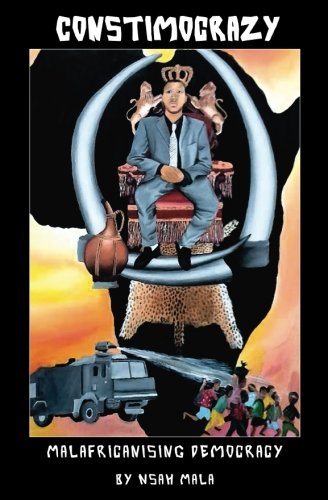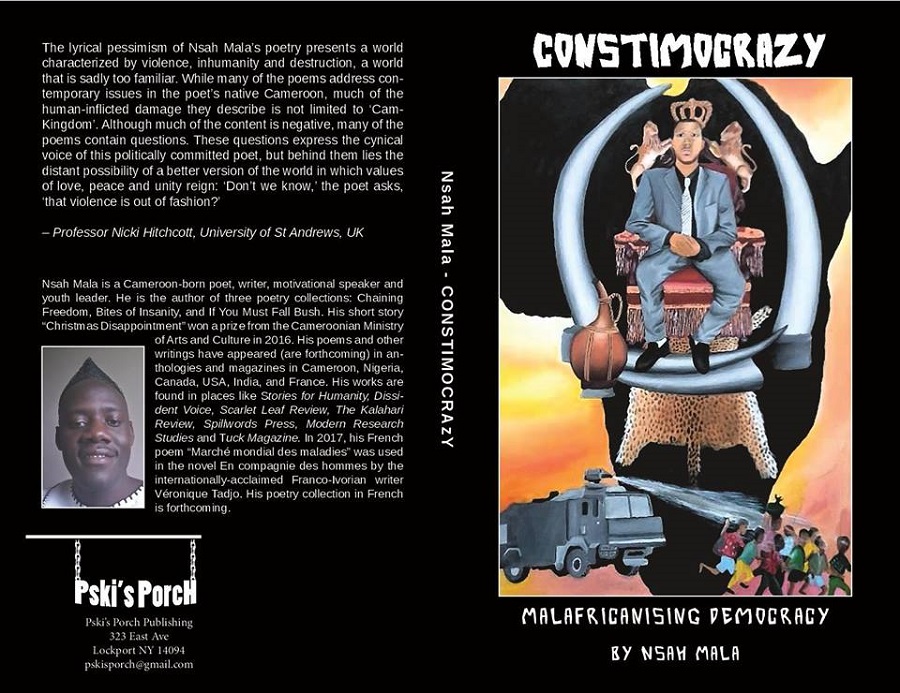Review
By
Dr Nelson Mlambo
This poetry collection is a profound expression of Afro-talent and the personification of an Afropolitan voice. Poetry resides in the innermost sensibilities of a soul, captured in the utmost exactitude of diction and read not by the eyes but by the heart. Such is the sensitivity of this collection of poems by one of Africa’s most promising mature-young poet. Constimocrazy: Malafricanising Democracy – the title itself exquisitely and poignantly captures the ‘breadth, depth and height’ of the poet’s ultra-national consciousness, and invites the reader to imaginatively dream of the caresses enshrined in the elegant rebelliousness that is in the poems.
Reading Nsah Mala’s poetry, you feel the rawness, the urgency and the novelty that accompany you to the next day. The poems speak of the silences, the silenced, the unsaid and the ‘unsayables’ of the world, ranging from the exotic to the steadily contemplative realities of life. The everydayness of life is birthed anew, and the new-some-ness of the mundane is what makes these poems stand out. The multidimensionality of the poems and their frankness speak of an African rootedness of didacticism in art, yet they have an alarming twinge of defamiliarisation and iconoclasm which reminds one of the late rebel writer from Zimbabwe, Dambudzo Marechera.
Reading the poems is an immersion into the multivoiceness of this rising star, and the social commitment of the poet is indeed in Achebean terms: ‘the novelist as a teacher’. For example, in the opening poem, ‘The Torch Ahead’, one senses the deeply philosophical, as well as the profoundly personal yet universal articulation of an awe-inspiring sense of resilience that resides in the human race. This universalism bespeaks a new cosmopolitan generation that is undeterred in its quest for fulfilling a God-given life mandate. Above all, one senses an eeriness and tranquillity that colour the poem, aided by the use of the personal pronoun ‘I’ as a way of engulfing the reader into the oxymoronically reassuring vortex of the poem. This poem provides an example of Nsah Mala’s poems which bring out the resilience of Afro-triumphalism.
The universal resonance of the poems in this collection is also evident in the treatment of literary universals and one such is the poeticisation of history and the aestheticisation of environmentalism, which in itself is an interesting read for those interested in ecocriticism. The poet’s environmental awareness as in the poems ‘Atlantic Shores’ and ‘Approaching Gorée Island’ goes beyond reminding the readers of the past to an enactment of the historical-now as a fact of life. However, despite the deeply historical and ponderous moments, Nsah Mala’s poems also provide moments of joy and celebration, and central is how the African vitality in the poet himself is unmistakably an identity badge of pride. This identity is however not a static and idealistic one, but one that is a mixture of diverse worlds which the poet embraces as an Afropolitan.
Another remarkable feature of the poems in this collection is the poet’s social commitment and artistic vision. Nsah Mala is not an innocent and non-partisan writer but a partisan poet of commitment and dedication. His dedication is towards justice, fairness and truth. The sharpness of observation and keenness of mind in the poet is evidenced by the wide array of what is happening around the poet, affording the alert reader a sense of verisimilitude. Constimocrazy: Malafricanising Democracy dares to articulate the unsayables – ranging from castigating the abhorrent sexploitation of the weak to the sadistic celebration of mightiness through evil and cruelty disguised as military might.
Nsah Mala unequivocally condemns the chronic modifications of national constitutions in many African countries which is an offshoot of increasing political selfishness and the African phenomenon of presidential/dictatorial sit-tightness. He also vehemently lambasts the marginalisation and internal colonisation of the minority Anglophones in his native Cameroon, that is, the perennial Anglophone Problem which is gravely worsening since the last quarter of 2016 when Anglophone lawyers and teachers – and later the general Anglophone populace – began a wave of protests demanding institutional reforms to safeguard the minority identity of Anglophones and have been brutally repressed by the Yaoundé Francophone-majority regime. The poet wears many suits; in one poem he is a feminist writer decrying the manipulation of the weak along gender lines; and then in the next he becomes a socio-political commentator lamenting the goriness and futility of military prowess; and then in the other one he becomes an advocate for refugees whose human condition is becoming an ever-worsening journey of uncertainty.
There is a mixture of joy and pain, celebration and lamentation as well as militancy and diplomacy in these poems, with subtle waves of observation which make this collection a joy for the bibliophile. The poems are beautifully crafted and sensitively intermixed, certainly a must read for those who want to dream and for those who desire to embrace the seductively freshness of the multiple voices from a son of the soil.
‘Constimocrazy: Malafricanising Democracy’ can be purchased here
Nsah Mala
Nsah Mala is the pen name for Kenneth Toah Nsah, a Cameroon-born poet, author of three poetry collection: Chaining Freedom (Miraclaire Publishing LLC, 2012), Bites of Insanity (Langaa RPCIG, 2015) and If You Must Fall Bush (Langaa RPCIG, 2016). His short story “Christmas Disappointment” was among ten winners in a short story competition organized by Cameroon’s Ministry of Arts and Culture in June 2016. In December of the same year, his short story “Fanta from America” received a Special Mention in a short story competition held by BAKWA Magazine. His poems and other writings have featured (or are forthcoming) in anthologies and magazines in Cameroon, Canada, India, Nigeria, and South Africa. He holds two degrees in (Teaching of) English and French and is currently studying for the Erasmus Mundus Masters Crossways in Cultural Narratives in France, UK and Spain.
Dr Nelson Mlambo
Dr Nelson Mlambo is a Senior Lecturer at the University of Namibia.





No Comments Yet!
You can be first to comment this post!